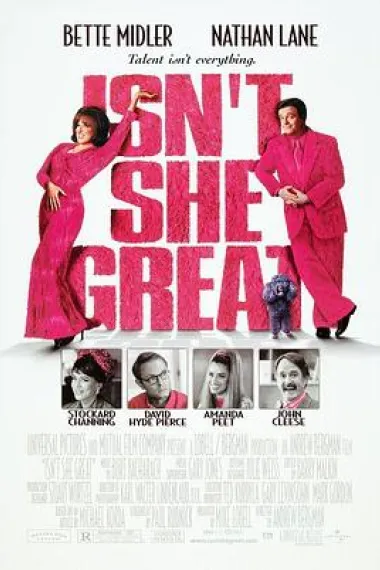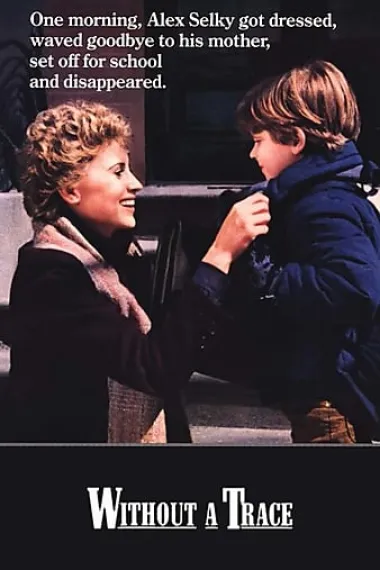
斯托卡特·詹宁 (1944) Stockard Channing
演员 配音
One of Broadway and Hollywood's perennial and cleverer talents who tends to shine a smart, cynical light on her surroundings, Stockard Channing was born Susan Williams Antonia Stockard on February 13, 1944 in New York City to a Protestant father and a Catholic mother of Irish descent. Her parents were Mary Alice (née English) and well-to-do shipping executive Lester Napier Stockard; the latter died when his daughter was 16 and left her a sizable estate.
Channing attended the eminent Chapin School in NYC, then later attended the Madeira School, a girls' boarding school in Virginia. She majored in both literature and history at Radcliffe College, from which she graduated summa cum laude in 1965. In 1964 she married Walter Channing Jr., a businessman whose surname she kept for part of her own stage moniker after their divorce four years later.
Interested in acting, she made her stage debut in a production of "The Investigation" at the experimental Theatre Company of Boston in 1966. She went on to play a number of offbeat roles with the company. She eventually migrated to New York where she took her first Broadway bow as a chorus member and understudy in the musical version of 'Two Gentlemen of Verona' in 1971. Two years later she would take over the prime role of Julia in the L.A. national company. Other theater roles during this time included 'Adaptation/Next' (1970) 'Arsenic and Old Lace' (1970), 'Play Strindberg' (1971), and 'No Hard Feelings' (1973).
Somewhat plaintive yet magnetic and unique-looking, the dark-haired actress began first appearing in pictures with small parts in the dark comedy The Hospital (1971) and the edgy Barbra Streisand fantasy-drama Up the Sandbox (1972). Taking on the top female lead as an heiress and potential victim of shysters Jack Nicholson and Warren Beatty in Mike Nichols' comedy The Fortune (1975), the film, despite its male star power and her Golden Globe nomination, would not become the star-making hit for Channing as initially predicted.
While her next two films, (The Big Bus (1976) and Sweet Revenge (1976)), didn't get her to first base with the public either, Channing hit a major home run with the TV-movie The Girl Most Likely to... (1973), a clever black comedy written by Joan Rivers wherein she played a former ugly duckling-turned-beauty (à la plastic surgery) who decides to attract and knock off the men who cruelly cast her aside earlier. Channing found her niche with this smart, sardonic character and it would take her quite far in Hollywood.
At age 33(!), Stockard was handed the feisty role of high-school "tough girl" Betty Rizzo in the box-office film version of the hit musical Grease (1978), starring Olivia Newton-John and John Travolta. While long in the tooth for such a role (as were most of the others in the lead cast), she compelled the audience to suspend disbelief in her sly performance, which earned her a People's Choice Award (Favorite Motion Picture Supporting Actress). This blockbuster clinched her place as a top-ranking star contender.
Handed two sitcom vehicles of her own within a year on CBS, Stockard Channing in Just Friends (1979) had her playing a newly-separated wife starting life anew in another city (L.A.) while The Stockard Channing Show (1980) starred her as a divorced lady again trying to find herself in L.A. Neither caught on and lasted but a few months. Stalled at a critical juncture in her career, she decided to return to her first love -- the theater. With 'Vanities', 'Absurd Person Singular', and 'As You Like It' (as Rosalind) already on her resume, she earned fine notices on Broadway with the musical 'They're Playing Our Song', succeeding Lucie Arnaz in 1980, then garnered rave reviews as the mother of a developmentally disabled child in the New Haven production of Peter Nichols' 'A Day in the Death of Joe Egg' in 1982. The actress repeated her role on Broadway a few years later (the title now shortened to "Joe Egg") and copped the 1985 Tony Award for Best Actress in a Play. Subsequent Tony nominations came her way for her offbeat work in 'The House of Blue Leaves' (1986); 'Six Degrees of Separation' (for which she also won an Off-Broadway Obie), 'Four Baboons Adoring the Sun' (1992); and for her Eleanor of Aquitaine in 'The Lion in Winter' in 1999.
Award-worthy projects again came her way on TV. Nominated for an Emmy for the CBS miniseries Echoes in the Darkness (1987), she also won a CableACE Award for her work in Tidy Endings (1988). In film, she received Oscar and Golden Globe nominations when her stage triumph, Six Degrees of Separation (1993), was turned into a film. This was followed by a rare vulnerable role as an abused, small-town housewife in the popular drag queen dramedy To Wong Foo Thanks for Everything, Julie Newmar (1995), a co-star role alongside Jennifer Tilly as two divorce-bound women who meet in Reno in Edie & Pen (1996), a prime role in the remake of Moll Flanders (1996) and as an eccentric aunt in the comedy/fantasy Practical Magic (1998). She also provided the voice of Barbara Gordon in several episodes of Batman Beyond (1999).
Channing has remained a highly productive, award-winning presence into the millennium on film, TV and the occasional stage. Beginning with a London Film Critics Circle Award for Best Actress in the film The Business of Strangers (2001), her other movies have included co-star or featured roles in Life or Something Like It (2002), Behind the Red Door (2003), Le divorce (2003), Must Love Dogs (2005), Sparkle (2007), Multiple Sarcasms (2010), and Pulling Strings (2013).
As part of the acclaimed cast of The West Wing (1999) as "First Lady" Abigail Bartlet, audiences were so drawn to her shrewd, classy character that producers wisely started featuring her regularly into the third season, winning both Emmy and SAG awards and a slew of nominations for this long-running role. Other awards came for social dramas. She received a second Emmy for her supporting turn as mother Judy Sheppard in The Matthew Shepard Story (2002), a docudrama about the gay-bashing murder of young Matthew Shepard, a Daytime Emmy for her role in the TV movie Jack (2004) in which she plays a wife who finds out her husband is gay, and a SAG nomination as a mother who discovers her teenage daughter is lesbian in The Truth About Jane (2000).
Stockard thought she finally found sitcom success with the series Out of Practice (2005) and was even Emmy-nominated for her role as a sharp-tongued but caring doctor. As luck would have it, however, a core audience was not to be found and the show lasted but a mere season. She fared better in a recurring part as Julianna Margulies' mother on the popular dramatic series The Good Wife (2009).
Returning to the stage, Stockard played "Lady Bracknell" in a 2010 Dublin production of 'The Importance of Being Earnest', and the following year was nominated for a Tony and Drama Desk for 'Other Desert Cities'. In 2018, she appeared in the play 'Apologia', co-starring Hugh Dancy in London.
Divorced four times, including to actor Paul Schmidt and writer/producer David Debin, she has no children. She has been in a three-decade-long relationship with cinematographer/gaffer Dan Gillham.
Channing attended the eminent Chapin School in NYC, then later attended the Madeira School, a girls' boarding school in Virginia. She majored in both literature and history at Radcliffe College, from which she graduated summa cum laude in 1965. In 1964 she married Walter Channing Jr., a businessman whose surname she kept for part of her own stage moniker after their divorce four years later.
Interested in acting, she made her stage debut in a production of "The Investigation" at the experimental Theatre Company of Boston in 1966. She went on to play a number of offbeat roles with the company. She eventually migrated to New York where she took her first Broadway bow as a chorus member and understudy in the musical version of 'Two Gentlemen of Verona' in 1971. Two years later she would take over the prime role of Julia in the L.A. national company. Other theater roles during this time included 'Adaptation/Next' (1970) 'Arsenic and Old Lace' (1970), 'Play Strindberg' (1971), and 'No Hard Feelings' (1973).
Somewhat plaintive yet magnetic and unique-looking, the dark-haired actress began first appearing in pictures with small parts in the dark comedy The Hospital (1971) and the edgy Barbra Streisand fantasy-drama Up the Sandbox (1972). Taking on the top female lead as an heiress and potential victim of shysters Jack Nicholson and Warren Beatty in Mike Nichols' comedy The Fortune (1975), the film, despite its male star power and her Golden Globe nomination, would not become the star-making hit for Channing as initially predicted.
While her next two films, (The Big Bus (1976) and Sweet Revenge (1976)), didn't get her to first base with the public either, Channing hit a major home run with the TV-movie The Girl Most Likely to... (1973), a clever black comedy written by Joan Rivers wherein she played a former ugly duckling-turned-beauty (à la plastic surgery) who decides to attract and knock off the men who cruelly cast her aside earlier. Channing found her niche with this smart, sardonic character and it would take her quite far in Hollywood.
At age 33(!), Stockard was handed the feisty role of high-school "tough girl" Betty Rizzo in the box-office film version of the hit musical Grease (1978), starring Olivia Newton-John and John Travolta. While long in the tooth for such a role (as were most of the others in the lead cast), she compelled the audience to suspend disbelief in her sly performance, which earned her a People's Choice Award (Favorite Motion Picture Supporting Actress). This blockbuster clinched her place as a top-ranking star contender.
Handed two sitcom vehicles of her own within a year on CBS, Stockard Channing in Just Friends (1979) had her playing a newly-separated wife starting life anew in another city (L.A.) while The Stockard Channing Show (1980) starred her as a divorced lady again trying to find herself in L.A. Neither caught on and lasted but a few months. Stalled at a critical juncture in her career, she decided to return to her first love -- the theater. With 'Vanities', 'Absurd Person Singular', and 'As You Like It' (as Rosalind) already on her resume, she earned fine notices on Broadway with the musical 'They're Playing Our Song', succeeding Lucie Arnaz in 1980, then garnered rave reviews as the mother of a developmentally disabled child in the New Haven production of Peter Nichols' 'A Day in the Death of Joe Egg' in 1982. The actress repeated her role on Broadway a few years later (the title now shortened to "Joe Egg") and copped the 1985 Tony Award for Best Actress in a Play. Subsequent Tony nominations came her way for her offbeat work in 'The House of Blue Leaves' (1986); 'Six Degrees of Separation' (for which she also won an Off-Broadway Obie), 'Four Baboons Adoring the Sun' (1992); and for her Eleanor of Aquitaine in 'The Lion in Winter' in 1999.
Award-worthy projects again came her way on TV. Nominated for an Emmy for the CBS miniseries Echoes in the Darkness (1987), she also won a CableACE Award for her work in Tidy Endings (1988). In film, she received Oscar and Golden Globe nominations when her stage triumph, Six Degrees of Separation (1993), was turned into a film. This was followed by a rare vulnerable role as an abused, small-town housewife in the popular drag queen dramedy To Wong Foo Thanks for Everything, Julie Newmar (1995), a co-star role alongside Jennifer Tilly as two divorce-bound women who meet in Reno in Edie & Pen (1996), a prime role in the remake of Moll Flanders (1996) and as an eccentric aunt in the comedy/fantasy Practical Magic (1998). She also provided the voice of Barbara Gordon in several episodes of Batman Beyond (1999).
Channing has remained a highly productive, award-winning presence into the millennium on film, TV and the occasional stage. Beginning with a London Film Critics Circle Award for Best Actress in the film The Business of Strangers (2001), her other movies have included co-star or featured roles in Life or Something Like It (2002), Behind the Red Door (2003), Le divorce (2003), Must Love Dogs (2005), Sparkle (2007), Multiple Sarcasms (2010), and Pulling Strings (2013).
As part of the acclaimed cast of The West Wing (1999) as "First Lady" Abigail Bartlet, audiences were so drawn to her shrewd, classy character that producers wisely started featuring her regularly into the third season, winning both Emmy and SAG awards and a slew of nominations for this long-running role. Other awards came for social dramas. She received a second Emmy for her supporting turn as mother Judy Sheppard in The Matthew Shepard Story (2002), a docudrama about the gay-bashing murder of young Matthew Shepard, a Daytime Emmy for her role in the TV movie Jack (2004) in which she plays a wife who finds out her husband is gay, and a SAG nomination as a mother who discovers her teenage daughter is lesbian in The Truth About Jane (2000).
Stockard thought she finally found sitcom success with the series Out of Practice (2005) and was even Emmy-nominated for her role as a sharp-tongued but caring doctor. As luck would have it, however, a core audience was not to be found and the show lasted but a mere season. She fared better in a recurring part as Julianna Margulies' mother on the popular dramatic series The Good Wife (2009).
Returning to the stage, Stockard played "Lady Bracknell" in a 2010 Dublin production of 'The Importance of Being Earnest', and the following year was nominated for a Tony and Drama Desk for 'Other Desert Cities'. In 2018, she appeared in the play 'Apologia', co-starring Hugh Dancy in London.
Divorced four times, including to actor Paul Schmidt and writer/producer David Debin, she has no children. She has been in a three-decade-long relationship with cinematographer/gaffer Dan Gillham.















